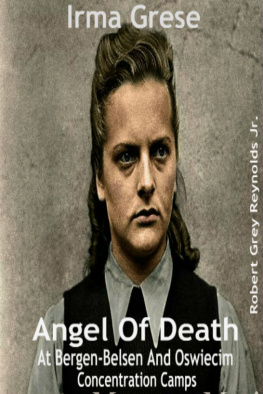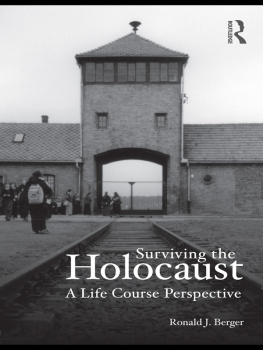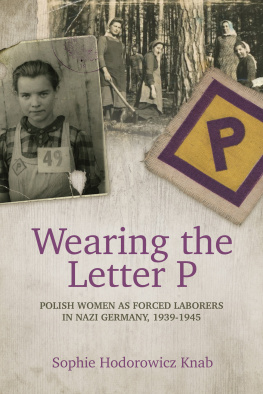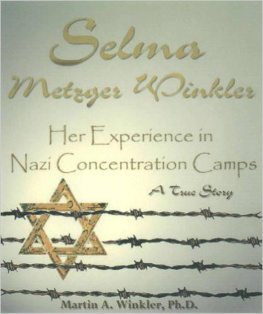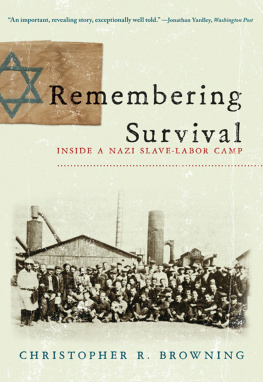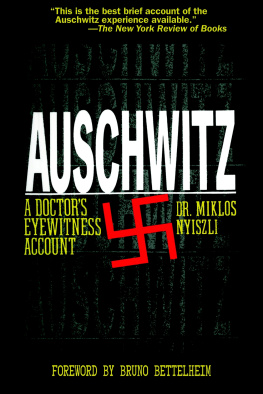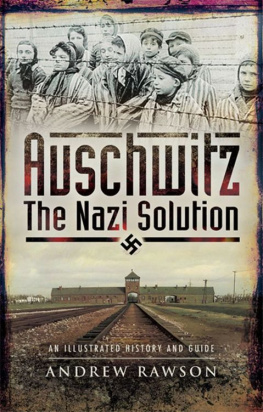
Jadzia at work in the dispensary; Hchst, October 1949.
A Polish Doctor in the Nazi Camps
My Mothers Memories of Imprisonment, Immigration, and a Life Remade
Barbara Rylko-Bauer
UNIVERSITY OF OKLAHOMA PRESS
NORMAN

2800 Venture Drive
Norman, Oklahoma 73069
www.oupress.com
The epigraph for this book is from The Turn of the Century, in Wislawa Szymborska, Miracle Fair: Seected Poems of Wislawa Szymborska, translated by Joanna Trzeciak. Copyright 2001 by Joanna Trzeciak. Used by persmission of W. W. Norton & Company, Inc.
Copyright 2014 by Barbara Rylko-Bauer. Published by the University of Oklahoma Press, Norman, Publishing Division of the University. Manufactured in the U.S.A.
All rights reserved. No part of this publication may be reproduced, stored in a retrieval system, or transmitted, in any form or by any means, electronic, mechanical, photocopying, recording, or otherwiseexcept as permitted under Section 107 or 108 of the United States Copyright Actwithout the prior permission of the University of Oklahoma Press.
For information about permission to reproduce selections from this book, write to Permissions, University of Oklahoma Press, 2800 Venture Drive, Norman, Oklahoma 73069 or email .
ISBN 978-0-8061-4431-3 (hardcover : alk. paper)
ISBN 978-0-8061-4584-6 (ebook : mobipocket)
ISBN 978-0-8061-4585-3 (ebook : epub)
This eBook was converted from the original source file by a third-party vendor. Readers who notice any formatting, textual, or readability issues are encouraged to contact the publisher at .
To Jadzias grandson
John Michael Rylko Bauer
It was supposed to be better than the rest, our twentieth century.
...................
Fear was to leave the mountains and valleys.
The truth was supposed to finish before the lie.
Certain misfortunes
were never to happen again
such as war and hunger and so forth.
...............
God was at last to believe in man:
good and strong.
But good and strong
are still two different people.
How to livesomeone asked me in a letter,
someone I had wanted
to ask the same thing.
Again and as always,
and as seen above
there are no questions more urgent
than the nave ones.
WISAWA SZYMBORSKA, The Turn of the Century
Contents
Illustrations
Unless otherwise noted, all photographs are in the family collection of Barbara Rylko-Bauer.
Photographs
Maps
Acknowledgments
THE PROJECT OF DOCUMENTING my mothers life began thirteen years ago. But its incubation started much earlier, so the list of people to whom I owe a debt of gratitude is quite long. Topping that list are three physicians who deserve my deepest thanks: my mother, Jadwiga Lenartowicz Rylko, for the gift of her story and for her love; my husband, Daniel Bauer, for his constant encouragement, loving patience, and insightful comments; and my friend Paul Farmer, who from the beginning believed in this ethnography of rediscovery, and challenged me to think beyond the story.
For years before this project began, a core group of friendsfellow anthropologistssaw the significance of this story, trusted in my ability to tell it, and repeatedly urged me to document my mothers experiences: Barbara Herr Harthorn, Mary Howard, Catherine Kingfisher, Barbara Rose Johnston, Ann Millard, Susan Stonich, Linda Whiteford, John van Willigen, and two who died in their prime, Elizabeth Adelski and Gay Becker.
I also wish to thank other colleaguesall dear friendswho patiently listened to my endless accounts of the project, provided insights on methods and relevant topics, participated in seminars or sessions that helped shape my thinking, or read and commented on different versions of the book. Especially important were Erika Bourguignon, Janet Brashler, Rose-Marie Chierici, Mary Howard, Linda Whiteford, and my collaborator, Alisse Waterston, who helped hone my sensibilities regarding the Jewish experience of the war and its aftermath during our long conversations about parents, Poland, history, and memory. Others who belong on this list include Philippe Bourgois, Ted Edwards, Gelya Frank, Kris Heggenhougen, Carolyn Nordstrom, Jim Quesada, Robert Rubinstein, Merrill Singer, and Athena McLean, who with Annette Leibing invited Alisse and me to contribute a chapter to their edited volume on the shadow side of fieldwork. I also appreciate Virginia Dominguezs support, while editor of American Ethnologist, for the article Alisse and I co-authored on our family narratives, and for placing the photographs of our parents on the cover of the journalthus honoring their stories and the histories they represented.
There were also local friends, non-anthropologists, who supported and cheered me on over this long research and writing process. I especially wish to thank Lucy Alt and Nancy Hejna (my walking partners), Carol Greenburg and Chantal Milligan (who are like sisters to me), Lori Hough (who, as an artist, understood my creative struggles) and Urszula Kassel (who helped me with Polish translations). In addition, I benefited from the friendship and insights of Marianne Dunn, Father Jim Chelich, Virginia Slaight, and the women in my decade-long book club (the Winers) who were with me on the evening my mother diedNancy Benzer, Judy Fanjoy, Beth Gumina, Sandy Haverkamp, Rebecca Kalinowski, Pat Marks, Alice ODonnell, Iris Postma, Mary Richardson, Mary Thompson, Shirley Workman, and Mary Taber (who photographed my mother and me several times over the years).
In Poland, I had the good fortune to meet several people who helped me with my research for this book. Tomasz Andrzejewski, director of the Nowa Sl Regional Museum, provided me with valuable primary and secondary historical sources and graciously hosted my visit to the city in 2011. Curators of the Museum of Independence Traditions in d, Maria Gowacka and Magorzata Lechowicz, were equally helpful, giving me a tour of the museum, answering numerous questions, connecting me with specific individuals, and directing me to useful sources regarding the womens prison where my mother was initially held after her arrest. I am very grateful to them for incorporating her story into the museum exhibit about the Nazi era. I also received assistance from staff at the National Archives and the Janusz Korczak Hospital in d; from the directors of the Warsaw and the d branches of the Institute for National RemembranceJerzy Eisler and Marek Druka; and from Elbieta Marciniak, director of the Deans office at the Medical University in Pozna, who shared priceless materials relating to my mothers medical education. Finally, these successful trips to Poland would not have been possible without the assistance and kindness of my family in Warsaw and d, who welcomed me into their homes, fed me fabulous food, drove me around, and took care of me in many ways.
Many other people contributed to the research or the book: Krista Hegburg and other staff at the United States Holocaust Memorial Museum; Chris Kochansky and Kate Whelan, who provided early editing; Elizabeth Hadas, who did the final copyediting; and Lisa Kaufman and Peter Osnos, who steered me in the right direction. I especially wish to thank Gretchen Schafft and Dorota Glowacka for their very detailed and useful reviews of the manuscript; Gerry Krieg for his wonderful maps; Ellis White for his photo wizardry; Kathleen Kelly, Alice Stanton, Steven B. Baker, and the rest of the wonderful staff at the University of Oklahoma Press; and most of all Jane Kepp, whose exemplary editing skills helped shape the final version of this book.
Next page

